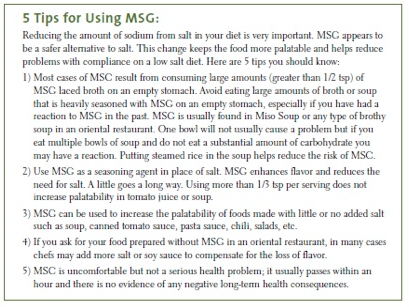Is MSG Safe?
 Back in 1968, a Korean-American physician wrote a letter to the editor of the New England Journal of Medicine describing an unusual reaction he often experienced while dining at a Chinese restaurant, which he dubbed the ?Chinese restaurant syndrome.?1 Dr. Kwok described the symptoms as ?numbness at the back of the neck, gradually radiating to both arms and the back, general weakness and palpitations.? Other anecdotal reports expanded the symptom complex to include muscle tightness, tingling or burning sensations, headache and chest pain or heart palpitations. More recently this reaction has been named the more politically correct ?MSG symptom complex? (MSC).
Back in 1968, a Korean-American physician wrote a letter to the editor of the New England Journal of Medicine describing an unusual reaction he often experienced while dining at a Chinese restaurant, which he dubbed the ?Chinese restaurant syndrome.?1 Dr. Kwok described the symptoms as ?numbness at the back of the neck, gradually radiating to both arms and the back, general weakness and palpitations.? Other anecdotal reports expanded the symptom complex to include muscle tightness, tingling or burning sensations, headache and chest pain or heart palpitations. More recently this reaction has been named the more politically correct ?MSG symptom complex? (MSC).What is MSG?MSG is the sodium salt of L-glutamic acid (GLU). GLU is the most common amino acid found in the human body and a major constituent of virtually every protein in the human body. It also occurs naturally in every plant and animal primarily as part of enzymes, structural proteins, etc. Free GLU is also found in varying amounts in many foods. Fermented soy products, Parmesan cheese and tomato juice all contain fairly large amounts of free GLU. Most proteins found in plants and animals contain from 5 to 25% GLU. Life as we know it would not be possible without glutamate. The average American consumes at least 5,000 to 10,000 mg of GLU daily even if everything they eat has no added MSG. Nevertheless, MSG is believed by many people to pose a serious threat to their health and well being.Is MSC Associated with Physical Symptoms?The MSC usually occurs when a fairly large amount of MSG is consumed on an empty stomach in a broth or soup. The consumption of MSG with solid foods has not been shown to consistently elicit MSC even in those who react to MSG taken with fluid and little or no carbohydrate (which blunts or blocks the MSC). The symptoms usually start within about 15 to 20 minutes and typically last about half an hour and never more than 2 hours. Under controlled conditions no objective changes in blood chemistry (except for a transient rise in GLU), blood pressure, skin temperature, etc. have been observed.2An epidemiological survey of about 5000 users and nonusers of MSG in Hawaii found that chronic use of MSG was not associated with any increase in neurological problems.3The MSC can be triggered in perhaps 30% of Americans who consumed at least 3 to 6 grams of MSG in a liquid on an empty stomach. The consumption of less than 2 grams is insufficient to create MSC symptoms in virtually everyone.4 Interestingly enough, more than 1 gram or 1/3 teaspoon of MSG per serving in tomato juice or soup does not improve its palatability.Does MSG Cause Allergic Reactions and Asthma?Two studies reported that MSG could trigger asthmatic attacks in people with asthma. However, in both these studies the patients were removed from their asthma medication(s) before the study. Removal of medication was probably the reason for the increase in symptoms on the day of the MSG challenge. Neither study used a control group. Six subsequent studies with control groups failed to find any difference in asthmatic subjects, some of whom believed MSG triggered bronchospasm. A recent review found no evidence linking MSG use to asthma.5 Another study found no evidence of hives being triggered by MSG.6Does MSG Promote Hypertension?A teaspoon of MSG has far less sodium than a teaspoon of salt (2,150 vs. 492mg). Sodium without chloride has little effect on blood pressure. Unlike salt, MSG contains no chloride. In one study, the consumption of up to 120 grams or 36 teaspoons (about 18,000 mg of sodium) per day of MSG for an extended period of time did not increase blood pressure. In fact, this extremely large amount of MSG caused a slight drop in BP and blood sugar levels and produced no detectable changes in neurological function.7 Other research has shown that the same amount of sodium from MSG or other sources compared with salt doesn?t raise blood pressure.8, 9The Bottom LineAt worst, MSG occasionally causes annoying but transient and harmless symptoms in a minority of people (see the tips below for avoiding these). Excess salt promotes high blood pressure, osteoporosis, stomach cancer, headaches and possibly cancer of the kidney and kidney stones. MSG can be an effective way to help Americans reduce their salt intake while enjoying many of their favorite foods. The recent DASH-Sodium trial, along with other research, has demonstrated beyond a reasonable doubt that Americans should be consuming less than 1500 mg of sodium daily to reduce problems with high blood pressure.10, 11
By Dr. James J. Kenney, PhD, RD, FACN, FMIReferences:1. Kwok RHM. N Engl J Med 1968;278:7962. Geha RS, et al. J Nutr 2000;130 (Suppl):1058-62S3. Go G Nakamura FH, Rhoads GG, Dickerson LE. Hawaii Med J. 1973;32:13-74. Kenney RA, Tidball CS. Am J Clin Nutr 1972;25:140-65. Stevenson DD. J Nutr 2000;130(suppl):1067S-73S6. Simon RA. J Nutr 2000;130(Suppl):1063S-66S7. Bazzan G, D?Elia JA, Olson RE. Science 1970;169:208-138. Kurtz TW, Hamoudi AA, Morris RC. N Engl J Med 1987;317:1043-89. Baegehold MA, Kutchen TA. Hypertension 1991;17(suppl):158-61.10. Sacks FM, et al. N Engl J Med. 2001;344:3-1011. Kenney JJ. Salt: Has it been given a fair shake? www.foodandhealth.com/


